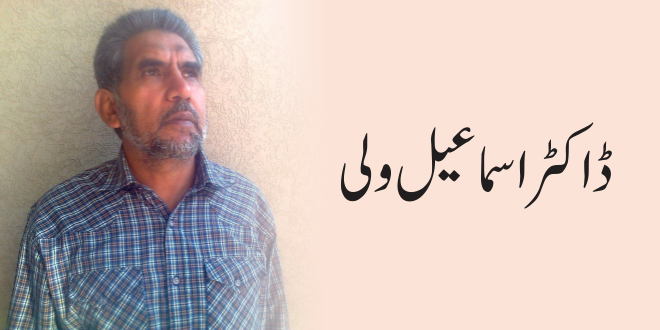The one who has lifted his shovel to repair Mastuj-Shandoor-Boroghil road? Let’s know about him. Sometimes you come across people of high commitment; dedication and intellect that you keep wishing to acquire the attributes they possess. District Chitral is also one of those regions that give birth to such people. It has been a fertile land in case of talent and passion.
One such personality is Dr.Muhammad Ismail Wali who proved that when you never give up and show commitment to your cause you will one day find your destination. My first introduction with such a learned man was in TerichMir Hostel Govt. Degree College Chitral where I used to board in 2006-2008 for my intermediate education.
Dr. Sahab was teaching the Arts Students so I had no chance of formal learning in his class. However, I was one of those fortunate students who visited him and try to learn from his general discussion. I also remember attending our college weekly Friday ceremony where sometimes he used to deliver lectures on general topics of importance.
Today I would like to share with you some information regarding Dr. Muhammad Ismail Wali which I have gathered from him during a visit and his outstanding work which won him Ph. D. in English. Now the happy news is that his dissertation has been recently published by Dorrance Publishing Company, Pittsburgh, Pennsylvania, USA. I heartily congratulate him on this success.
Dr. Ismail Wali opened his eyes on 1st march 1960 in Mastuj, a village in northern Chitral. He passed his Matriculation Examination in 1976 from Govt High School Mastuj with First Division. In 1978 he passed his intermediate in Arts (FA) from Govt. Degree College Chitral.
His quest for learning and knowledge triggered him further for graduation from Karachi University as a private candidate in 1980 with English as majors. While as a private candidate he had a chance to learn from some famous teachers like Khalique Ahmad, Editor, Al-Yaqeen International. After doing his Masters in English from Jahanzeb College Swat he started teaching at Booni College on Adhoc basis. During this period he passed the competitive exam for lectureship.
His M.Phil research was Matthew Arnold’s poetry titled A Journey through Night. His milestone works start after that when he gets involved in doing his Ph.D. on “A Midsummer Night’s Dream: Shakespeare’s Syzygy of Meaning”. For an undergraduate student of Business Administration like me, it is not possible to understand it and interpret it in easy words, though I had the honor to turn over a few pages of the book.
From the few pages of the book, I was able to collect some excerpts as follows which would be helpful to those who would like to know and read the book. Dream and its symbolic variants—fiction, fancy, fantasy, or imagination—have no practical value and pragmatic meaning unless and until placed in a Jungian context. In this regard, mainstream criticism focuses on dream-literature as “escapistic.” This study explores Jungian themes in Shakespeare’s A Midsummer Night’s Dream in such a way as to make it an experience for soul-making. The whole study revolves around the key idea of syzygy which Jung uses to conceptualize the contra-sexual archetypes/psychic energies as anima in man and animus in women respectively.
Apart from the Prologue and Epilogue, the study is divided into four chapters. The Prologue looks at the critical history of Dream followed by a brief orientation to the seminal syzygial patterns in it to prepare the reader how to contextualize the text and its contents.
The first chapter, titled “Crystal is Muddy,” takes us into the psyche of Shakespeare’s Dream to see what is the role of the paradoxical themes and structures in energizing the dialectical progression of events in the play. The analysis shows that the persona of Athens grows too old to cope with new changes and challenges of life, which is always in flux. The events in the woods, i.e. the dream-mode, in a way, deconstruct the rigidity observed at the waking level so that a fresh and flexible persona emerges to accommodate the issues of the young generation.
The second Chapter “Hot Ice-I” deals with the issue of identity-formation in the first phase of life. After the psychological “birth,” the youngsters—Lysander and Hermia, Demetrius and Helena—pass through the projection-making stage, which functions as a symbolic heat for their psychological maturation, epitomized as “summarizing” process. Their marriage at the end symbolizes typological compensations, making a whole in a syzygial way.
In the third Chapter, “Hot Ice-II,” he explores the theme of the middle age crisis occurring to Theseus and Hippolyta. Their love grows out of “war,” which is symbolic of the extraverted process during youth. They turn back on their unconscious, the psychic source from which flows the psychic energies. The events in the woods function like a dream for them, from which they reawake to compensate for the psychological lack in each other.
The fourth Chapter “Cold Fire” deals with the theme of psychological wholeness in Jungian studies, usually explained through trinity/quaternity symbols. This chapter concludes with how A Midsummer Night Night’s can be read as “The Midwinter’s Reality.”
Dr. M.Ismail Wali is interested in philosophy, psychology, mysticism, and literature (Persian and Urdu). He also writes Khowar poetry on the themes of corruption, mismanagement, the motivation of the youth for hard work. He uses “Akhgar” as his poetic name (takhl’lus). He is currently appointed in the Institute of Management Sciences, Peshawar, as Assistant Professor of English. He believes in the use of spiritualism for self- growth and for productive interpersonal communication. His book “A Midsummer Night’s Dream: Shakespeare’s Syzygy of Meaning” can be googled easily and costs 31 US Dollars.
SHARE YOUR VIEWS: Agreement with Facebook Comments by Zeal is not mandatory!


